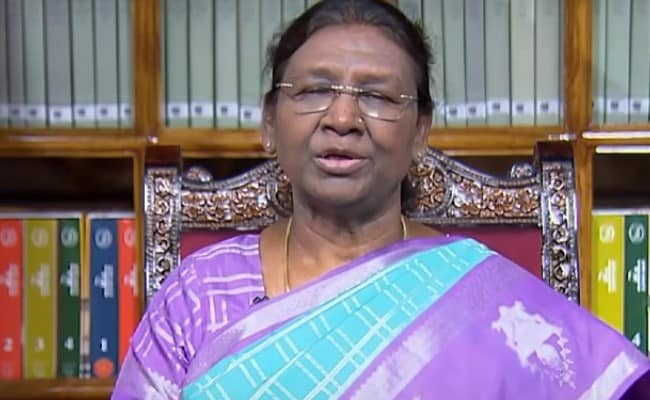
There are many hindrances in the way of equal access to justice, said President Murmu. (File)
New Delhi:
President Droupadi Murmu on Tuesday said the “cost” and the use of English language in the higher judiciary are among the hindrances in the way of equal access to justice, and emphasised on their removal.
Addressing a conference in Delhi, she emphasised on the need to launch an awareness campaign among people, living in rural areas and those from socially disadvantaged groups, to help them make them conscious of their rights and get legal assistance.
President Murmu said equality is not only the foundation of justice, but a necessary condition of it too.
“It has been long since the world proclaimed that all human beings are equal, but we need to ask ourselves if we all have equal access to justice,” she said.
In practice, it means some people are often unable to seek redressal of their grievances due to several factors, the president said.
“Our principal task is to remove those obstacles. The chief obstacle, of course, is often the cost of justice,” President Murmu said, addressing the valedictory session of the first regional conference on ‘Ensuring Access to Quality Legal Aid for the Vulnerable: Challenges and Opportunities in the Global South’ in Delhi.
She said that access to justice for all has been a theme close to her heart and mentioned several steps taken to help economically disadvantaged sections of society to approach legal institutions for remedial action. Steps taken by the National Legal Services Authority, that is, NALSA, have also played a key role in expanding legal aid, the President said.
“The aim, on the whole, has been to advance ‘ease of justice’. But I feel that there is a need to launch an awareness campaign among people not only to make them conscious of their rights, but also to help them get legal assistance, if such a need arises,” President Murmu said.
Such an awareness campaign must focus on rural areas and socially disadvantaged groups to dispel the impression that justice is the advantage of the strong, the President said.
There are many more hindrances in the way of equal access to justice, she said.
In India, for example, the language of the higher judiciary is English, which makes it difficult for a large section of society to understand the judicial processes, President Murmu said.
“However, the Supreme Court of India has started publishing verdicts in various regional languages on its website. Legal aid institutions also help in bridging the language divide,” she noted.
President Murmu said technology holds great promise in making access to legal aid more democratic.
“It has reduced distances and made justice dispensation easier in many cases… An innovative attitude in integration of technology in the justice delivery system will make it more inclusive as well as more efficient,” the President said.
President Murmu said the regional conference focuses on the Global South.
“Due to a variety of historical forces, this group of countries still continues to battle poverty. The task before us is to raise the standards of living for all. Gandhiji used to call it ‘sarvodaya,’ the welfare of all. Access to justice is, naturally, a very important tool to achieve that goal,” she said.
The Global South, then, faces challenges which are quite similar in nature yet they are different from the rest of the world, President Murmu said, adding that “we can respond to these challenges by joining hands and by sharing our best practices.”
“I believe that making legal aid accessible to people in need is the cornerstone of any modern state. It plays a crucial role in shaping a social order which is equitable, just and worthy of trust,” President Murmu said.
The NALSA together with the International Legal Foundation (ILF), the United Nations Development Programme (UNDP) and the United Nations Children’s Fund (UNICEF) had organised this two-day regional conference with the goal to address the challenges in ensuring access to quality legal aid services in the countries of the Global South.
“With participation of 69 Africa-Asia-Pacific countries of the Global South in this conference, this event is a significant milestone in our collective pursuit of justice and equality,” the President said.
Chief Justice DY Chandrachud, Union Law Minister Arjun Ram Meghwal, several Supreme Court judges and other dignitaries attended the event.
(Except for the headline, this story has not been edited by NDTV staff and is published from a syndicated feed.)




